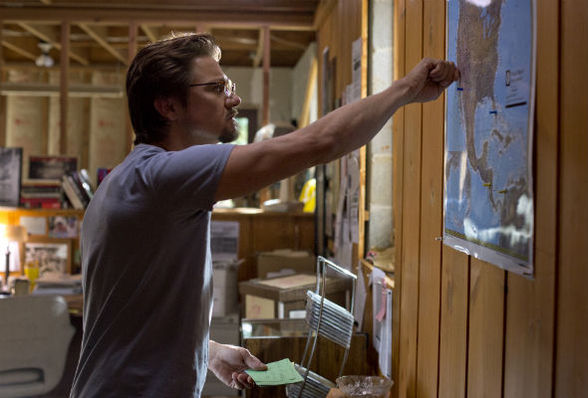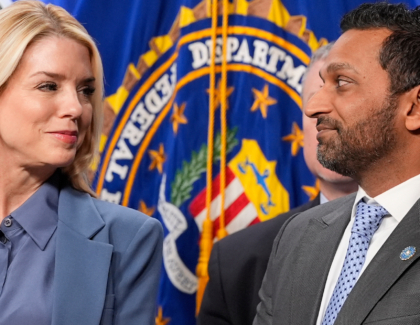Sign up for the daily CJR newsletter.
Jeremy Renner as San Jose Mercury News investigative reporter Gary Webb in Kill The Messenger (Chuck Zlotnik/Focus Features)
When filmgoers see Kill The Messenger, opening in a fortnight, they may not know Gary Webb’s name. But they will probably recognize Jeremy Renner, who plays the late San Jose Mercury News journalist. Known for his intense leading man roles in The Hurt Locker and The Bourne Legacy, Renner’s Webb is an iconoclast who ribs his superiors, smoothly bribes a Nicaraguan prison official, and delivers pithy yet endearingly idealistic one-liners (When his editor mentions “drug dealers,” Webb retorts: “Alleged drug dealers. This is America”).
Even if some filmgoers missed Webb’s 20,000-word “Dark Alliance” series, which in 1996 blew the lid off the CIA-backed Nicaraguan contras’ role in selling cocaine to America, the David and Goliath narrative of a nefarious government security agency bullying a lone truth-teller is sure to resonate with an NSA-conscious, post-Snowden public.
And by the time a contrite CIA officer breaks into Webb’s motel room in the dead of night to confess the agency’s sins (an event which never happened), the Los Angeles Times sends a 17-man team to discredit Webb’s story (which did happen), and the epilogue explains his eventual suicide at age 49, there ought to be no doubt in the audience’s mind where the film’s moral weight lands.
It may not be nuanced, but that’s not the point. The film’s takeaway is that a decade after he shot himself alone at home, 17 years after his exile from mainstream media, and 18 years since he first published one of the biggest investigative stories of the decade, Webb’s public image has come full circle: from discredited pariah, to passionate yet flawed muckraker, to tragic hero.
Webb’s reputation took a nosedive months after “Dark Alliance” when The Washington Post, The New York Times, and the LA Times all published stories criticizing his reporting. Instead of furthering Webb’s central claims, later proven to be true, they picked holes in his story. The LA Times, scooped by out-of-towners, assembled a “get Gary Webb team” as a reporter on the assignment described to CJR in 1997. The Mercury published a frontpage retraction. Webb spent some time in their Cupertino bureau before leaving and never worked for a major outlet again.
The maverick protagonist’s story, based primarily on Nick Schou’s eponymous 2004 book about Webb, as well as on Webb’s own reporting, is suited for director Michael Cuesta, who also helmed TV’s Homeland.
Webb appeared to have the cowboy attitude that Hollywood loves. He was a fearless critic with a good heart, “a guy who made a career out of sticking sticks in people’s eyes for all the right reasons,” according to former colleague Bill Sloat in the American Journalism Review.
“He saw himself as a watchdog, as a cop on the beat, as a guy to really get the truth out,” said Cuesta in an interview this week. “He was able to see bad guys and good guys very clearly.”
Webb’s reporting was both questioned and misinterpreted after its publication. Through loose phrasing and the series logo of a CIA crest with the silhouette of a crackpipe, his stories implied, but did not explicitly state, that the CIA was responsible for the US’ crack epidemic. That sparked conspiracy theories that the government was intentionally targeting black neighborhoods. “The ‘Dark Alliance’ series was passionate, not clinical,” reported Esquire. “The headlines were tabloid, not restrained.”
“Mistakes were made,” said Cuesta. “Our movie doesn’t show every mistake.”
Yet two years after “Dark Alliance,” a CIA inspector general report confirmed they had relationships with Nicaraguan drug dealers. The revelation corroborated the core of Webb’s claims, even if the media establishment still saw him as damaged goods.
Kill The Messenger is a final vindication of sorts. While simplified and stylized, it may well be the last word on Webb’s life. Like Webb’s own reporting, the film might be loose with some of the details but, in its bones, it’s the truth.
Has America ever needed a media defender more than now? Help us by joining CJR today.







